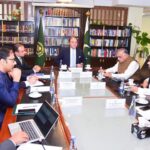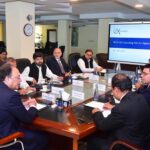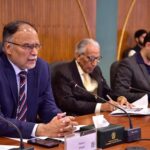By M. Ashraf Wani & Shams Abbasi
ISLAMABAD, Sep 18 (APP): Notwithstanding the unsuccessful attempts by the Pakistan Tehreek-i-Insaf to derail the country’s fragile economy, the incumbent government had successfully struck a deal with International Monetary Fund (IMF), saving the country from impending default.
Amidst the challenges of depreciating rupee against dollar and burden of repayment of loans, there could have been no other quick fix than to restore the IMF program as the government needed immediate respite in a challenging situation.
The situation had become more taxing after the devastating floods across the country that inundated hundreds of thousands houses and livestock and crops on millions of acre, giving s severe blow to already struggling economy.
In this situation, Federal Minister for Finance and Revenue, Miftah Ismail and his team had made untiring efforts to put the Extended Fund Facility (IMF) program back on track. The minister, in his interviews and press conferences, has been vehemently articulating that had the IMF program not been approved, the country would have been facing threat of default.
Moreover, in view of recent floods that inflicted loss of approximately US$30 billion to the national economy, approval of loan facility under EFF by IMF had rekindled hopes of economic survival.
“Agreement with the board has opened other bilateral and multilateral funding avenues for Pakistan, already in dire need to cope with existing economic situation amid flood destruction,” said an economic expert at Finance Ministry.
“The program will strengthen country’s external sector and help improve economy as multilateral donors and borrowing agencies would have more confidence in Pakistan,” he added.
The government has also engaged with external financial institutions and expects some encouraging news in near future to overcome economic recession as well as meet the expenses being incurred on flood affected people.
During last week of August, the IMF Executive Board had completed the combined seventh and eighth reviews of the EFF extended arrangement for Pakistan and approved disbursement of SDR 894 million (about US$1.1 billion).
Although the program brought a sigh of relief, yet it is not all and the government and economic managers will have to go extra miles for averting such situation in future and overcoming budget and trade deficit.
Furthermore, it would need extra finances to meet the needs of flood affected in terms of food, shelters and then rehabilitating the infrastructure.
Economic experts advocate consistent and well thought out approach to cope with the challenges ahead focusing both the short and long term strategies.
They have strongly pleaded the need for unanimity of thought and uniformity of policies on economic front, formulate ‘Charter of Economy’ to steer country out of crisis and pave way for a resilient and sustainable economy.
“It is high time for the political leaders and economic experts in the country to work jointly for improving national economy, plagued by multiple issues like trade deficit, price hike, production growth, stable currency and poverty alleviation,” President Islamabad Chamber of Commerce and Industry (ICCI) Shakeel Munir told APP.
He said people were already living in miserable conditions due to international oil prices, Ukraine war as well as global price hike of edibles and other commodities, when this ethereal calamity hit them. “This has further added to their hardships and would need respite to meet their ends.”
Munir mentioned to huge losses to crops and livestock, fearing that prices of household items would continue to haunt the consumers and it was imperative to devise a proper pricing mechanism for lowering the burden of people especially the poor and lower middle class.
The impending food items sacristy also calls upon the political strata to avoid any misadventure like protests and agitations that may further deepen miseries of people and land the country in serious crisis.
Renowned economic expert and former finance minister, Dr. Hafeez Pasha, termed the current economic situation as serious particularly due to huge losses inflicted by the devastating flood. “It is time for adopting a common plan of action on economy with joint efforts in view of current challenging situation,” he remarked. “We need to focus more on economic challenges failing which we would be in more trouble during days ahead.”
Chairman Federation of Pakistan Chambers of Commerce and Industry (FPCCI) Islamabad Chapter, Qurban Ali also laid emphasis on thinking beyond politics at this time. “In my view, a unanimous approach was direly needed. I support the idea of Charter of Economy to cope with massive challenges the country was facing,” he stated.
Political instability is another serious and all political parties’ are duty bound to stop politicking on economic issues including agreement with IMF and stand united at least to adopt a unanimous agenda for economic revival.
Deputy Executive Director, Sustainable Development Policy Institute (SDPI), Dr. Sajid Amin said the government had taken difficult decisions to correct the economy though it had affected common man. “Sometimes for the ultimate gains in future people have to bear hardship in their present,” he said suggesting the government to ease out poor’s hardships through social safety program.
Therefore, it is high time for the political parties to avoid unnecessary politicking and pulling the masses to streets for personal gains, in utter neglect of the economic challenges faced by the country.






